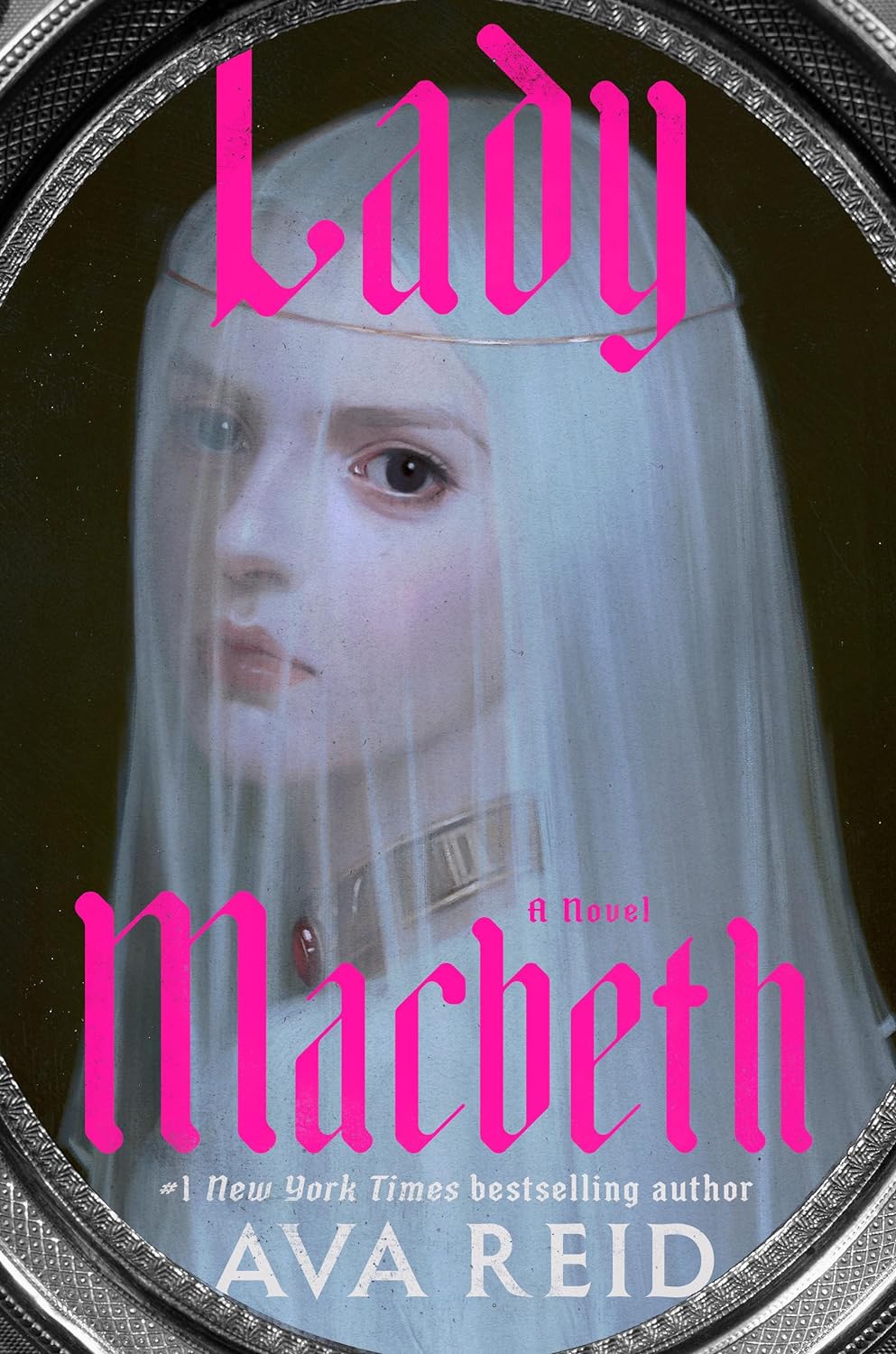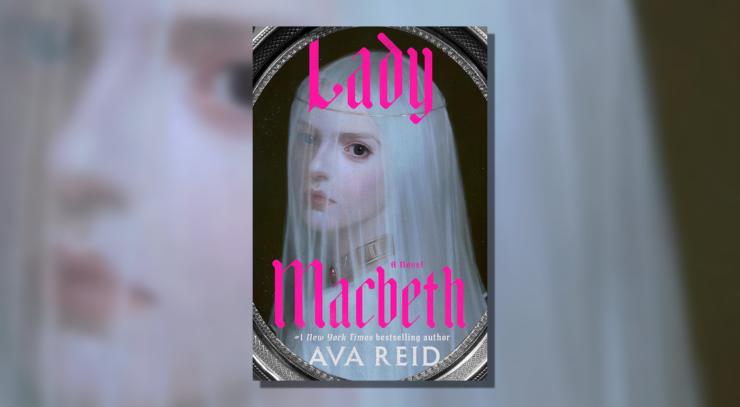We’re thrilled to share an excerpt from Lady Macbeth, a novel by Ava Reid reimagining Shakespeare’s Macbeth—out from Del Rey on August 13th.
The Lady knows the stories: how her eyes induce madness in men.
The Lady knows she will be wed to the Scottish brute, who does not leave his warrior ways behind when he comes to the marriage bed.
The Lady knows his hostile, suspicious court will be a game of strategy, requiring all of her wiles and hidden witchcraft to survive.But the Lady does not know her husband has occult secrets of his own. She does not know that prophecy girds him like armor. She does not know that her magic is greater and more dangerous, and that it will threaten the order of the world.
She does not know this yet. But she will.
He rises in silence and beckons her to follow. Roscille keeps her eyes mainly on the ground, but occasionally she looks up and sneaks glances at him, her husband. There is a scar lacing his throat, white and rigid, like a worm in an apple. It is not a clumsy by-blow. It cannot be anything but death, beaten back.
He takes her down another narrow hallway, in the opposite direction of her chamber, then down a set of crumbling stairs to an even narrower corridor. The sound of the sea rises, and so does the sound of their footsteps, as if the floor is growing thinner. At the end of this hallway is a door. Its iron grate withers with rust.
“A husband and wife should have no secrets from each other,” Macbeth says. “And they should keep each other’s secrets from the world.”
Before Roscille can think of how to reply, he removes a key, tied to a leather thong around his neck. He fits it into the lock. The sea roars up at them, and then is curiously silent. Wood scrapes stone as he pushes the door open.
Behind the door, blackness stretches out in all directions. It is not the barbarian blackness she first witnessed upon arriving in Glammis, the bleak edge of civilization. This is an unnatural darkness, such that would confound the pope himself. The air blowing toward them is damp and cold, and although light slides through the threshold behind them, it halts very suddenly, the darkness a wall it cannot breach.
Macbeth takes a step forward and there is a splashing sound. Water, he has stepped into water. Roscille blinks and blinks, but staring into the unchanging black makes her eyes gummy, as if with sleep. Is she supposed to follow? The air has a terrible weight, like the pressure at the deepest chasm of the ocean.
Buy the Book


Lady Macbeth
And then: light. Filmy and indistinct, a single torches flares in the center of her vision. The reflection of the flame races along the dark water, in clever beams and quick flashes. The water has a serpent’s iridescent sheen.
Her husband stands in the center of the room, which is really a cave, rock formations jutting outward from the walls at strange angles. He is as silent and still as the rock itself.
The current judders around him. Three different currents, all converging, sucking at the hem of his tartan. Three women stand in the water at a distance, backs hunched with age, hair scraggly and silver, each holding a sopping garment in her hands. Each woman slaps the water with her cloth, then wrings it out, then soaks it again. Submerges, lifts, submerges, forming her own tight, snarling whirlpool.
Roscille stumbles backward and falls against the mold-slick wall. She makes a bleating sound of fear, of disbelief, which her husband does not seem to hear. Then she stands and crosses herself.
But the act feels like mockery: She invokes the Holy Trinity, the Father the Son the Holy Spirit, as the three women advance toward her, their faces white as lightning. They are so thin under their own wet garments that each notch of their spines can be clearly seen. Their hair is so long that the ratty ends brush the water.
“Buidseach,” Macbeth breathes. The world is cold smoke in the air. Witch.
It is only then that Roscille sees the shackles around their bony wrists, and the long length of rusty chain that ties them all together. As they move, it drags against the cave floor. If they come any closer, they will strain their binds, and the metal will cut into their soggy flesh, which looks as though it would fall easily off their bones, like rot from a log.
“Macbeth,” one of them says. Hisses.
The other two echo her: “Macbeth.” “Macbeth.”
Roscille read this among the monk’s tomes: Duncane has written a treatise on witchcraft in Scotland. Witches exist; he has proven it. They kill swine and perform spells with their entrails. They send storms to chase sailors to their watery graves. They turn men into mice, and women into serpents who swallow them. They can hide in the skin of any woman, but they may be identified by their sharp teeth. Or by their silver hair.
In Breizh, there is no such canonical accounting. The Duke would not waste his efforts on the creatures of hell, just as he does not waste it on the matters of heaven: Only rarely can he be persuaded to attend Mass. In Alba, the punishment for witchcraft is death. What is the punishment for keeping witches as prisoners?
Macbeth casts his torch across the water. “I come to hear your prophecy. Tell me my fate.” Their eyes are milky white, with mortal blindness. Their noses are just notches in their faces. When the light catches them, their skin seems to sizzle, like oil in heat.
“All hail Macbeth,” the first one rasps, “Thane of Glammis!”
The other two clap in approval, chains jangling. Their damp, soft flesh slaps together.
“All hail Macbeth,” cries the second, “Thane of Cawder!”
And then, together: “All hail Macbeth! All hail Macbeth! All hail Macbeth!” They shout and shout, until their voices pile on top of one another, like heavy gouts of rain into the river, water upon black water. They shout until the words blur, their thin-lipped mouths open in bacchanalian glee, as if they are expecting wine to pour from the very air and down their throats.
Perhaps Roscille should drink from it as well. Her plan, once merely callous, now made blasphemous, vulgar, truly evil, sanctified by these unholiest of creatures.
Macbeth turns to her, his face gleaming in the torchlight.
“You see,” he says. “My lust for blood will be rewarded. We leave for Cawder at dawn.”
Excerpted from LADY MACBETH by Ava Reid. Copyright © 2024 by Ava Reid. All rights reserved. No part of this excerpt may be reproduced or reprinted without permission in writing from the publisher.










